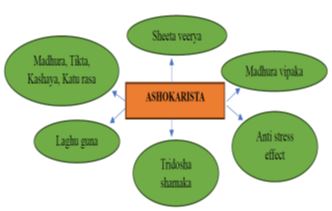An analysis of Psychological Issues during Menopause and its integrative management
DOI:
https://doi.org/10.21760/jaims.8.12.14Keywords:
Menopause, Psychological symptoms, Integrative managementAbstract
Menopause is indeed a normal physiological stage in a woman's life, typically occurring in the late 40s to early 50s, although the exact timing can vary from person to person. This transitional phase is frequently associated with a spectrum of physical, mental and cognitive symptoms. During the menopausal transition, many women commonly encounter physical symptoms like hot flashes, night sweats, vaginal dryness, irregular menstruation, sleep disturbances, depletion of bone health, weight gain and a decrease in sexual desire. Additionally, this phase can contribute to fluctuating hormone levels which can precipitate mental issues like mood swings, anger and irritability, heightened anxiety, loss of self-esteem, loss of confidence, low mood and feelings of sadness or depression. Memory and cognitive changes like forgetfulness and difficulty in concentration are often reported during menopause, sometimes referred to as "brain fog" or "menopausal cognitive impairment." For some, these symptoms serve as early indicators of the onset of this life transition. Integrative management of mental health problems during menopause involves a holistic approach that combines conventional medical treatments with complementary and alternative therapies to address both the physical and emotional aspects of menopausal symptoms. It includes stress reduction techniques, lifestyle modifications, counselling and psychotherapy, dietary supplements, internal- external medications and regular health care check-ups. Many women consider menopause as inherently a negative experience as it comes with various challenges and symptoms. Seeking medical advice and support can help women navigate this transition more smoothly and positively.
Downloads
References
Santoro N, Epperson CN, Mathews SB. Menopausal symptoms and their management. Ecl Clinics. 2015;97:2892-2923. doi: 10.1016/j.ecl.2015.05.001. PMCID: PMC4890704. PMID: 26316239.
Yadav V, Jain A, Dabar D, Goel AD, Sood A, Joshi A, Agarwal SS, Nandeshwar S. A meta-analysis on the prevalence of depression in perimenopausal and postmenopausal women in India. Asian J Psychiatry. 2021;57:102581.
Polisseni AF, de Araújo DAC, Polisseni F, Mourão Junior CA, Polisseni J, Fernandes ES, Guerra MO, et al. Depression and anxiety in menopausal women: associated factors. Rev Bras Ginecol Obstet. 2009;31(7):374. PMID: 19347226.
Dutta DC. Dutta’s Textbook of Gynaecology including Contraception. 7th ed. New Delhi: Jaypee Brothers Medical Publishers (P) Ltd; 2016. p. 46.
Rössler W, Ajdacic‐Gross V, Riecher‐Rössler A, Angst J, Hengartner MP. Does menopausal transition really influence mental health? Findings from the prospective long‐term Zurich study. World Psychiatry. 2016;15(2):146-154. doi: 10.1002/wps.20319. PMCID: PMC4911775. PMID: 27265705.
Sushrutha. Sushruta Samhitha with the Nibanda Sangraha commentary of Sri Dalhanacahrya and the Nyayachandrika panjika of Sri Gayadasacharya on Nidanasthana. Varanasi: Chaukambha Samskritha Samsthana.
Vagbhata. Astanga Hrdaya with commentaries Sarvangasundara of Arunadatta and Ayurveda Rasayana of Hemadri. Varanasi: Chaukhambha Samskritha Samsthana; Reprint edition 2015.
Sushrutha. Sushruta Samhitha with the Nibanda Sangraha commentary of Sri Dalhanacahrya and the Nyayachandrika panjika of Sri Gayadasacharya on Nidanasthana. Varanasi: Chaukambha Samskritha Samsthana.
Vagbhata. Astanga Hrdaya with commentaries Sarvangasundara of Arunadatta and Ayurveda Rasayana of Hemadri. Varanasi: Chaukambha Samskritha Samsthana; Reprint edition 2015.
Vahata or Vridha Vagbhata. Astanga Samgraha with the Sasilekha Sanskrit commentary by Indu. Edited by Dr. Shivaprasad Sharma. Varanasi: Chaukambha Krishnadas Academy; 3rd edition.
Samami E, Shahhosseini Z, Elyasi F. The effects of psychological interventions on menopausal hot flashes: A systematic review. Int J Reprod Biomed. 2022;20(4):255–272. doi: 10.18502/ijrm.v20i4.10898. PMCID: PMC9260068. PMID: 35822187.
Usha VNK. Streeroga Vinjan: A Textbook on Gynaecology. Delhi: Chaukamba Sanskrit Prathisthan; Reprinted 2011. p. 61.
Shipra, Sirigere N. Ayurvediya Streeroga Vigyan. New Delhi: Chaukambha Publications; 1st edition, 2021. p.192.
Modi MB, Donga SB, Dei L. Clinical evaluation of Ashokarishta, Ashwagandha Churna and Praval Pishti in the management of menopausal syndrome. Ayu. 2012 Oct-Dec;33(4):511–516. doi: 10.4103/0974-8520.110529. PMCID: PMC3665193. PMID: 23723668.














